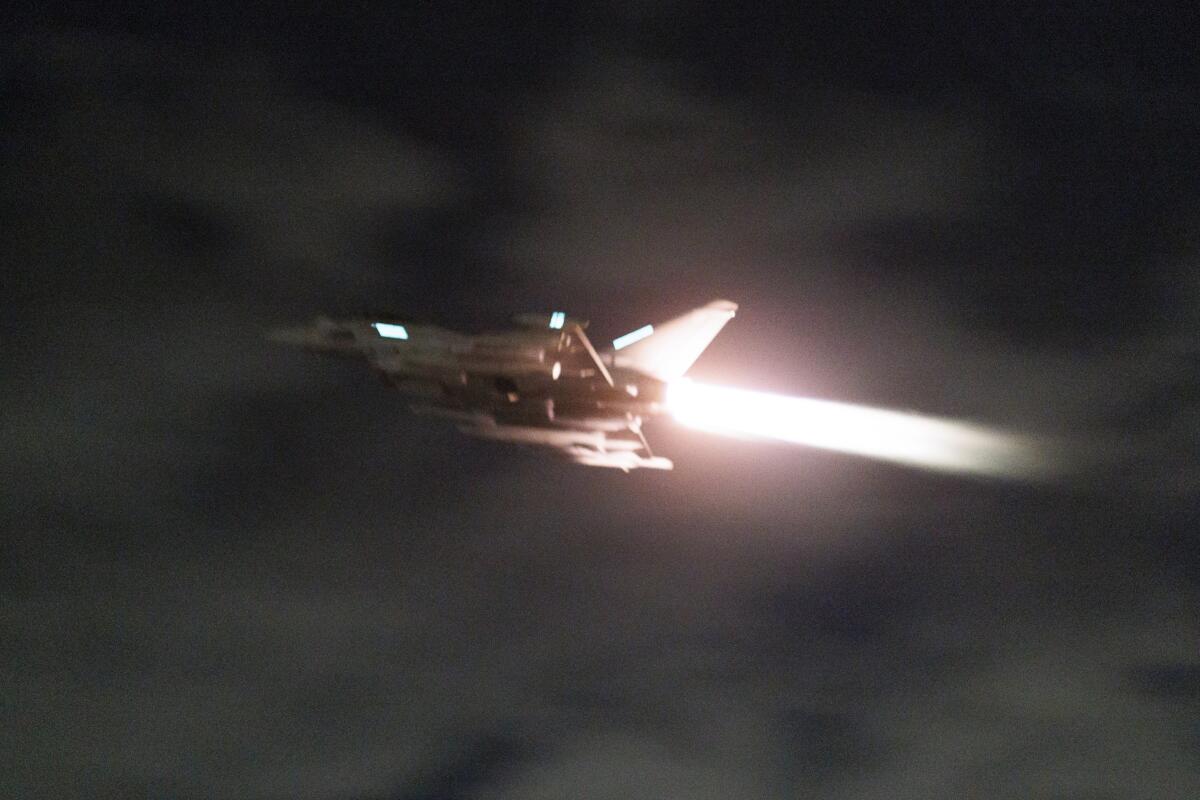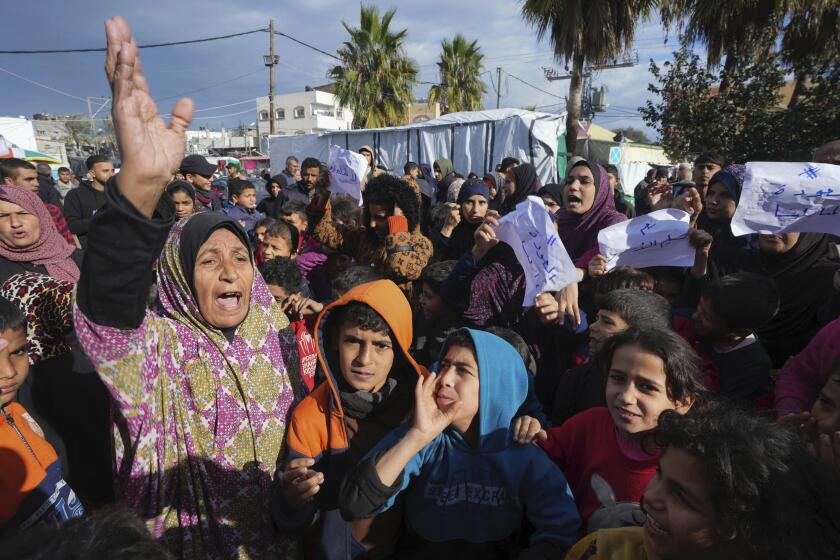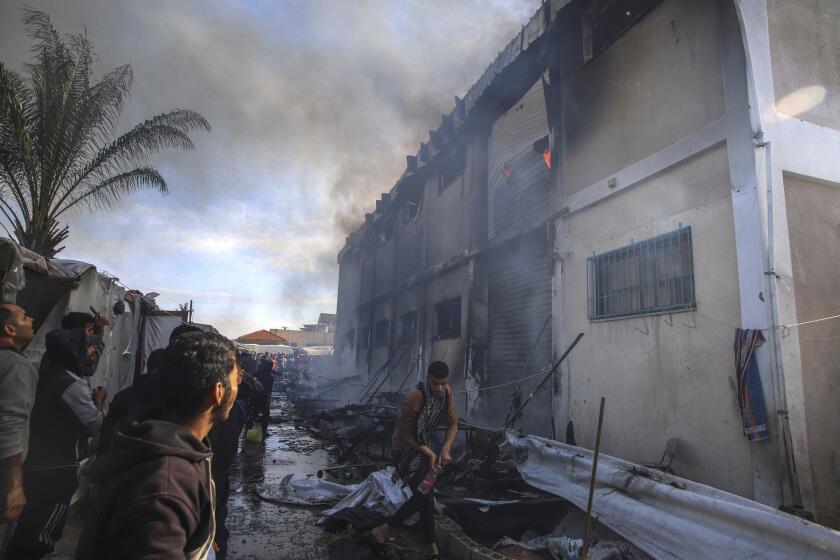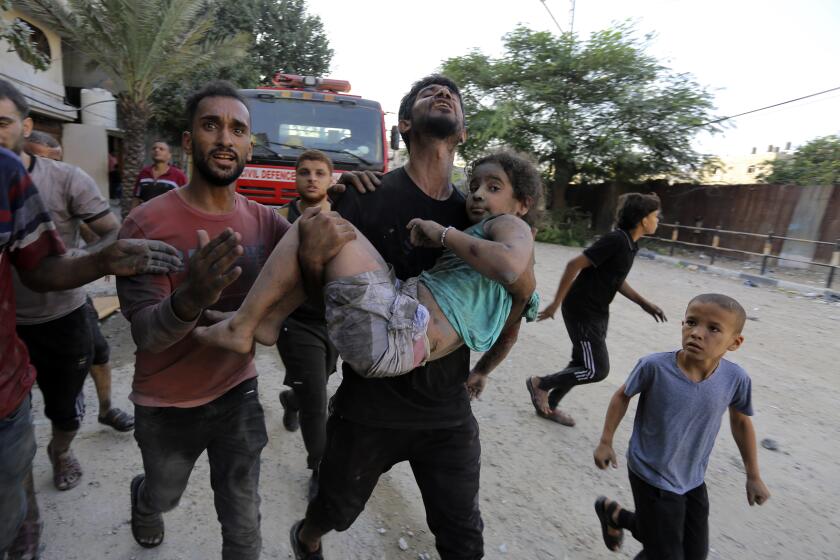U.S. warns of further retaliation if Iran-backed militias continue their attacks

- Share via
JERUSALEM — After a weekend of retaliatory strikes, the United States on Sunday warned Iran and the militias it arms and funds that it will conduct more attacks if American forces in the Mideast continue to be targeted, but said it does not want an “open-ended military campaign” across the region.
“We are prepared to deal with anything that any group or any country tries to come at us with,” said Jake Sullivan, President Biden’s national security advisor. Sullivan said Iran should expect “a swift and forceful response” if it — and not one of its proxies — “chose to respond directly” against the U.S.
Sullivan delivered the warnings during a series of interviews with TV news shows after the U.S. and Britain on Saturday struck 36 Houthi targets in Yemen. The Iran-backed militants have fired on American and international interests repeatedly since the start of the Israel-Hamas war.
An air assault Friday in Iraq and Syria targeted other Iranian-backed militias and the Iranian Revolutionary Guard in retaliation for the drone strike that killed three U.S. troops in Jordan last weekend. The U.S. fired again at Houthi targets on Sunday.
“We cannot rule out that there will be future attacks from Iranian-backed militias in Iraq and Syria or from the Houthis,” Sullivan said. He said the president has told his commanders that “they need to be positioned to respond to further attacks as well.”
The U.S. has blamed the attack at the Tower 22 base in Jordan on Jan. 28 on the Islamic Resistance in Iraq, a coalition of Iranian-backed militias. Iran has tried to distance itself from the drone strike, saying the militias act independently of its direction.
Biden “is not looking for a wider war,” Sullivan said when questioned about the potential for strikes inside Iran that would expand the conflict in the volatile region. But when asked about the possibility of direct escalation by the Iranians, he said: “If they chose to respond directly to the United States, they would be met with a swift and forceful response from us.”
Sullivan appeared on NBC’s “Meet the Press,” ABC’s “This Week,” CNN’s “State of the Union” and CBS’ “Face the Nation.”
While pledging to respond in a “sustained way” to new assaults on Americans, Sullivan said he “would not describe it as some open-ended military campaign.”
Still, he said, “We intend to take additional strikes and additional action to continue to send a clear message that the United States will respond when our forces are attacked or our people are killed.”
While Gazans hold Israel principally responsible for their suffering, many also blame Hamas for not foreseeing the consequences of its Oct. 7 attack.
There will be more steps taken, he said. “Some of those steps will be seen. Some may not be seen.”
The U.S. attack on dozens of sites in Iraq and Syria hit more than 85 targets at seven locations. These included command and control headquarters, intelligence centers, rockets and missiles, drone and ammunition storage sites and other facilities that were connected to the militias or the Islamic Revolutionary Guard Corps’ Quds Force, the expeditionary unit that handles Tehran’s relationship with, and arming of, regional militias.
The Biden administration has so far appeared to stop short of directly targeting Iran or senior leaders of the Quds Force within its borders.
The U.S. military said it did not have any confirmation of civilian casualties from those strikes, Sullivan said. “What we do know is that the targets we hit were absolutely valid targets from the point of view of containing the weaponry and the personnel that were attacking American forces. So, we are confident in the targets that we struck.”
Some of the militias have been a threat to U.S. bases for years, but the groups intensified their assaults in the wake of Israel’s war with Hamas after the Oct. 7 attack on Israel that killed about 1,200 people and saw 250 others taken hostage. More than 27,000 people have been killed by Israel’s offensive against Hamas in Gaza, the territory’s Health Ministry has said.
The Houthis have conducted almost daily missile or drone attacks against commercial and military ships transiting the Red Sea and Gulf of Aden and they have made clear that they have no intention of scaling back their campaign despite a new international force to protect vessels in the vital waterway.
U.S. attacks overnight Sunday struck across six provinces of Yemen held by the Houthi rebels, including in Sana, the capital. The Houthis gave no assessment of the damage but the U.S. described hitting underground missile arsenals, launch sites and helicopters used by the rebels.
“These attacks will not discourage Yemeni forces and the nation from maintaining their support for Palestinians in the face of the Zionist occupation and crimes,” Houthi military spokesman Brig. Gen. Yahya Saree said. “The aggressors’ airstrikes will not go unanswered.”
Meanwhile, Iran warned the U.S. over potentially targeting two cargo ships in the Mideast long suspected of serving as a forward operating base for Iranian commandos. The statement from Iran on the Behshad and Saviz ships appeared to signal Tehran’s growing unease over the U.S. strikes across the region.
The Behshad and Saviz are registered as commercial cargo ships with a Tehran-based company the U.S. Treasury has sanctioned as a front for the state-run Islamic Republic of Iran Shipping Lines. The Saviz, then later the Behshad, have loitered for years in the Red Sea off Yemen, suspected of serving as spy positions for Iran’s Revolutionary Guard.
Experts say Israel’s deadly raid on a West Bank hospital may have violated international laws, including a ban on combatants posing as doctors or civilians.
In 2017, Saudi Arabia described the Saviz as a maritime base and weapons transshipment point for the Guard, staffed by men in military fatigues. Video aired by Saudi-owned television channels showed the vessel armed with what appeared to be a covered machine gun bolted to the ship’s deck.
In the video statement Sunday by Iran’s regular army, a narrator for the first time describes the vessels as “floating armories.” The narrator describes the Behshad as aiding an Iranian mission to “counteract piracy in the Red Sea and the Gulf of Aden.” However, Iran is not publicly known to have taken part in any of the recent campaigns against rising Somali piracy in the region off the back of the Houthi attacks.
Just before the new campaign of U.S. airstrikes began, the Behshad traveled south into the Gulf of Aden. It’s now docked in Djibouti in East Africa just off the coast from a Chinese military base in the country.
The International Court of Justice’s ruling comes at an early stage in South Africa’s case alleging that Israel’s actions in Gaza amount to genocide.
The statement ends with a warning overlaid with a montage of video of U.S. warships and an American flag.
“Those engaging in terrorist activities against Behshad or similar vessels jeopardize international maritime routes, security and assume global responsibility for potential future international risks,” the video said.
The U.S. Navy’s Mideast-based 5th Fleet declined to comment about the threat.
Civilian deaths in Gaza have fueled global outrage. But many Israelis, still raw from Hamas’ Oct. 7 attack, have scant interest in the war’s toll on Palestinians.
The Saviz is now in the Indian Ocean near where the U.S. alleges Iranian drone attacks recently have targeted shipping.
Gambrell reported from Jerusalem, Baldor and Copp from Washington. Associated Press writers Nasser Karimi in Tehran and Brian Melley in London contributed to this report.
More to Read
Sign up for Essential California
The most important California stories and recommendations in your inbox every morning.
You may occasionally receive promotional content from the Los Angeles Times.














